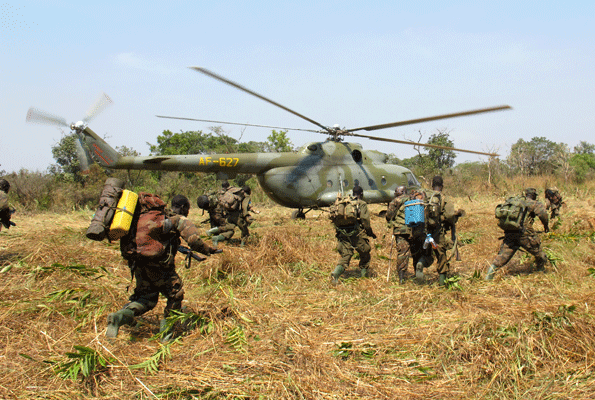
Around 50 people have been killed in Bria, in the Central African Republic, when clashes broke out between rival armed factions despite the signing a day earlier of a truce deal, the mayor of the town has said.
Bodies lay in the streets of Bria, around 580km northeast of the capital, Bangui, and dozens more people were treated for shotgun wounds after fighting erupted at dawn on Tuesday.
“I can say there are around 50 dead. There are 42 bodies that were taken to the hospital. There are also bodies in the neighbourhoods that have not been picked up yet,” Maurice Belikoussou, mayor of Bria, told the Reuters news agency.
Witnesses said houses were looted and set on fire during the clashes. The medical charity Doctors Without Borders, known by its French initials MSF, said it had already received 35 wounded by 9:30am (08:30 GMT) at the hospital it runs in the town. Most had been shot.
The country, one of the poorest in the world, has been plagued by conflict since 2013 between the mainly Muslim Seleka rebels and the Christian Anti-Balaka militia that started after the overthrow of leader Francois Bozize.
We have to defend ourselves’
Tuesday’s clashes broke out just a day after the CAR government and 13 of the 14 rebel groups agreed to an immediate ceasefire. The deal was brokered by the Catholic community Sant’Egidio in five days of negotiations in Italy’s capital, Rome.
Under the agreement, armed groups were granted political representation in exchange for an end to attacks and blockades.
“We signed the agreement, but we have to defend ourselves, we can’t allow an attack to happen without reacting,” Djamil Babanani, spokesman for the Popular Front for the Rebirth of the Central African Republic (FPRC), an armed rebel group formerly belonging to the Muslim Seleka coalition, told the AFP news agency.
The fighting erupted near a camp housing people who had been forced to flee previous bouts of violence, according to MINUSCA, the United Nations peacekeeping mission in the country.
“We regret the presence of armed elements in IDP (Internally Displaced Persons) camps, which causes problems not just in Bria but also in other locations. It’s a reality,” said MINUSCA spokesman Vladimir Monteiro.
Clashes last month in Bria, Alindao, Bangassou and Mobaye, east of the capital Bangui, resulted in a total of around 300 dead and 200 wounded, according to the UN’s humanitarian coordination agency OCHA.
The UN says that the country is facing a dire humanitarian crisis. More than 50 percent of CAR’s population requires humanitarian assistance.
At least one in five Central Africans are currently displaced, the highest proportion since the height of the crisis in 2014.
Peace deal: ‘A lot of work to be done’
The office of President Faustin-Archange Touadera, who was elected last year, applauded Monday’s deal, calling it “an historic accord”. However, other reactions in Bangui were less optimistic.
(This accord) simply follows the same scenario repeated over and over,” said Joseph Bindoumi, president of the Central African League of Human Rights. “Those who signed are mocking the people.”
Lewis Mudge, a researcher in the Africa Division at Human Rights Watch, said the accord signed in Rome comes after several other similar initiatives over the past few recent years failed to bring about an end to the violence.
“The real work begins now in getting these groups to cease attacks on civilians,” he told Al Jazeera. “The accord is signed at a time when violence is on the increase in the east of the country and the civilian population is desperate for the violence to stop.”
aljazeera
